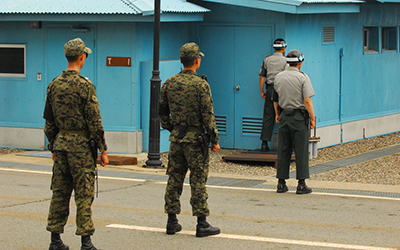De/militarized Ecologies: Making Peace with Nature Along the Korean DMZ

Forum Theatre, Arts West (Building 148)
MapInspired by the flourishing of nonhuman nature in the context of unending war, a wide network of South Korean and international scientists, bureaucrats, journalists, natural scientists, citizen ecologists and others have, since the late 1960s, sought visions of peace in the paradoxically protected nature of the Korean Demilitarized Zone (DMZ).
With the end of the Cold War, multiple national and transnational narratives have informed the cultural meanings of the Korean DMZ. In this public lecture, Eleana Kim argues that these include hopes for inter-Korean reconciliation, dystopian futures of climate change and mass extinction, and what she identifies as a South Korean peace imaginary that has emerged out of this particular historical conjuncture. This imaginary animates diverse discourses of peace, life, and nature, which are easy to dismiss as naive and romanticising. However, by focusing attention on actual multispecies encounters, Eleana Kim suggests how the DMZ’s ecologies might yet offer cosmopolitical alternatives to geopolitics as usual.
Hosted by the Conflict, Development, Justice Cluster, School of Social and Political Sciences.
Presenter
Associate Professor Eleana Kim, Associate Professor of Anthropology
Eleana Kim is associate professor of anthropology at UC Irvine, and the author of Adopted Territory: Transnational Korean Adoptees and the Politics of Belonging (Duke UP, 2010), which received the James B. Palais Prize from the Association of Asian Studies, and the Social Science Book Award from the Association of Asian American Studies. Her research on the ecologies of the Korean DMZ has been funded by the WennerGren Foundation and the ACLS, and related articles may be found in Cultural Anthropology, Social Research, and the forthcoming edited volume, How Nature Works (SAR Press).